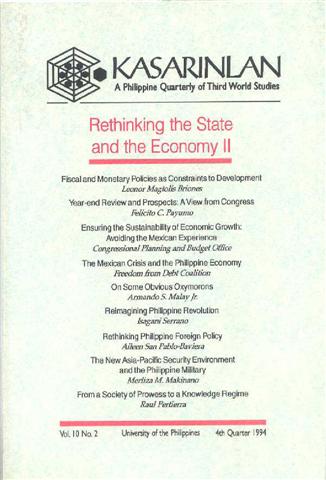Rethinking Philippine Foreign Policy
Abstract
Much has been written about the collapse of socialism, the decline of ideology and the rise of geo-economics, conflicts of ethnicity and nationality, an information revolution, and the globalization of an increasingly borderless world. There have also been previous studies on the emerging global order (or disorder) that they may represent. However, this paper does not discuss these matters anew. Rather, this piece considers how some of these changes provide new and complex conditions for the Philippines and the people in the long and difficult struggle for a free and democratic, prosperous, and secure existence. It looks at the challenges presently confronting the conduct of the Philippines' foreign relations, herein understood as the process that mediates the nation's aspirations and interests on the one hand, and the fluid external environment on the other. It looks at how the Philippines must define its relationship with existing and emergent world powers. It concludes by examining the ways whereby foreign policy can be oriented to assist in the country's domestic social development agenda.
Published
2008-06-06
How to Cite
SAN PABLO-BAVIERA, Aileen.
Rethinking Philippine Foreign Policy.
Kasarinlan: Philippine Journal of Third World Studies, [S.l.], v. 10, n. 2, june 2008.
ISSN 2012-080X.
Available at: <https://journals.upd.edu.ph/index.php/kasarinlan/article/view/886>. Date accessed: 27 aug. 2025.
Section
Features
By submitting a manuscript, the authors agree that the exclusive rights to reproduce and distribute the article have been given to the Third World Studies Center.



